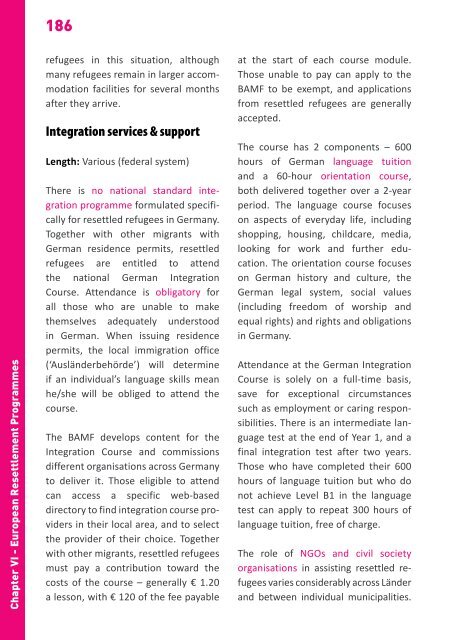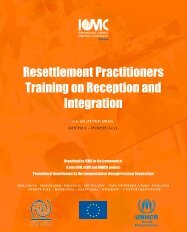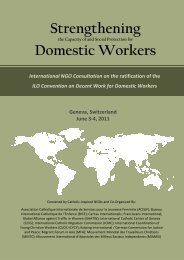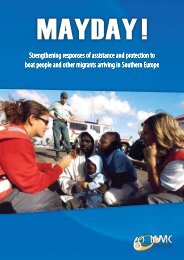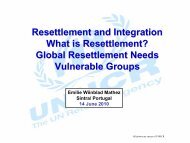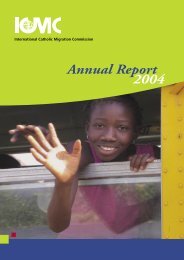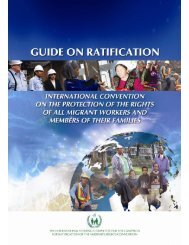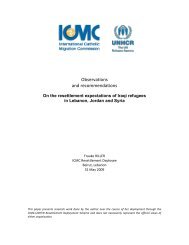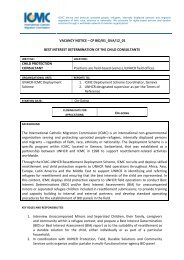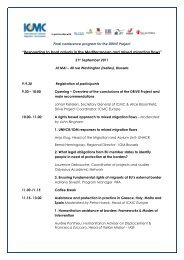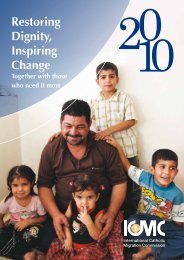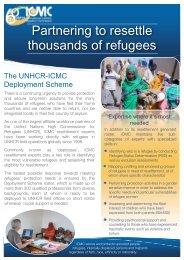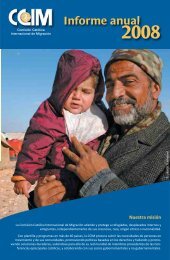ICMCEUROPE WelcometoEurope.pdf (5.89 MB)
ICMCEUROPE WelcometoEurope.pdf (5.89 MB)
ICMCEUROPE WelcometoEurope.pdf (5.89 MB)
You also want an ePaper? Increase the reach of your titles
YUMPU automatically turns print PDFs into web optimized ePapers that Google loves.
186<br />
Chapter VI - European Resettlement Programmes<br />
refugees in this situation, although<br />
many refugees remain in larger accommodation<br />
facilities for several months<br />
after they arrive.<br />
Integration services & support<br />
Length: Various (federal system)<br />
There is no national standard integration<br />
programme formulated specifically<br />
for resettled refugees in Germany.<br />
Together with other migrants with<br />
German residence permits, resettled<br />
refugees are entitled to attend<br />
the national German Integration<br />
Course. Attendance is obligatory for<br />
all those who are unable to make<br />
themselves adequately understood<br />
in German. When issuing residence<br />
permits, the local immigration office<br />
(‘Ausländerbehörde’) will determine<br />
if an individual’s language skills mean<br />
he/she will be obliged to attend the<br />
course.<br />
The BAMF develops content for the<br />
Integration Course and commissions<br />
different organisations across Germany<br />
to deliver it. Those eligible to attend<br />
can access a specific web-based<br />
directory to find integration course providers<br />
in their local area, and to select<br />
the provider of their choice. Together<br />
with other migrants, resettled refugees<br />
must pay a contribution toward the<br />
costs of the course – generally € 1.20<br />
a lesson, with € 120 of the fee payable<br />
at the start of each course module.<br />
Those unable to pay can apply to the<br />
BAMF to be exempt, and applications<br />
from resettled refugees are generally<br />
accepted.<br />
The course has 2 components – 600<br />
hours of German language tuition<br />
and a 60-hour orientation course,<br />
both delivered together over a 2-year<br />
period. The language course focuses<br />
on aspects of everyday life, including<br />
shopping, housing, childcare, media,<br />
looking for work and further education.<br />
The orientation course focuses<br />
on German history and culture, the<br />
German legal system, social values<br />
(including freedom of worship and<br />
equal rights) and rights and obligations<br />
in Germany.<br />
Attendance at the German Integration<br />
Course is solely on a full-time basis,<br />
save for exceptional circumstances<br />
such as employment or caring responsibilities.<br />
There is an intermediate language<br />
test at the end of Year 1, and a<br />
final integration test after two years.<br />
Those who have completed their 600<br />
hours of language tuition but who do<br />
not achieve Level B1 in the language<br />
test can apply to repeat 300 hours of<br />
language tuition, free of charge.<br />
The role of NGOs and civil society<br />
organisations in assisting resettled refugees<br />
varies considerably across Länder<br />
and between individual municipalities.


